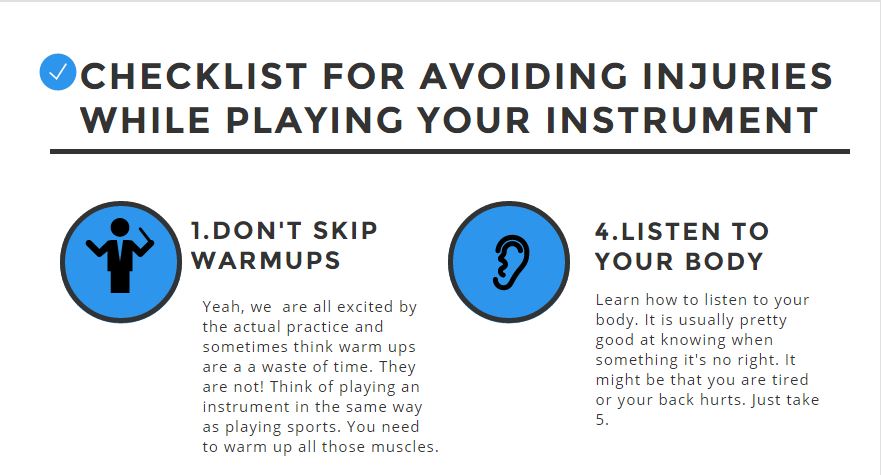6 Tips to avoid injuries while playing your instrument
Probably you have heard about the trumpeter’s lip, the clarinetist’s finger and the fiddler’s neck. Or maybe you have experienced yourself those long moments of excruciating pain while playing your instruments. Even our Play with a Pro founder, Adam, has the clarinetist’s finger and he is quite proud of it. So you may ask, hey... there are so many sensitive spots because there are so many different instruments, can there really be pieces of advice that come in handy to all musicians? The answer is yes, we have come up with 6 routine tips that can easily be followed by all musicians.
The tips are easy to follow, useful and they will help you for sure. Just have a look at the infographic below. And here’s another thought: try stretching exercises with your fellow musicians while rehearsing. It will not only be a real treat for your muscles, but it can also be a really good and fun team-building exercise. Just think about it!
Have you ever had an injury? What kind of advice do you have for your fellow musicians to avoid injuries? Let us know in the comments and have a good practice everyone!
Now that you are a bit more aware of your body and how to prevent injuries, let’s get a bit nerdy about it and look at why musicians are so exposed to these injuries. The scientific term that defines these injuries is repetitive strain injury. It is usually determined by at least three factors: instrument design, general physical condition and stress.
Choose the instrument design that best fits your body. Have a look if the size and weight is comfortable enough and it does not require you to make an extra effort to hold or lift your instrument. Think about the flutist’s position of playing. If the angle is not right between the arms, the flute and the rest of the body, then probably the flute does not have the right size.
When you play your instrument you often have to be in the same position for a many hours. This is why these affections are called repetitive strain injuries. You have to make the same movements over and over again when you play and you can’t really alternate postures. This is why it is important that you treat your body as the source of energy which allows you to carry on playing. So once again, here are some more good habits you can follow: warm up your muscles, take breaks, don’t overdo practicing especially if you feel very tired, maybe do some muscle stretching and strengthening sport (for example yoga).
Both emotional and physical stress can have significant consequences. You have an audition or an important concert coming soon and you can simply only think about how to practice more hours with less breaks. Of course you are exposed to intense moments of emotional stress and of course you want to give the best out there, but take a minute and think how this puts also a lot of stress and pressure on your body. As mentioned, far too many times already in this blog post, protect your body!
The good news is that these threats can be minimized or actually dismissed if you develop and follow a simple procedure. Hope that you will feel the difference!
by Felicia Gheorghe